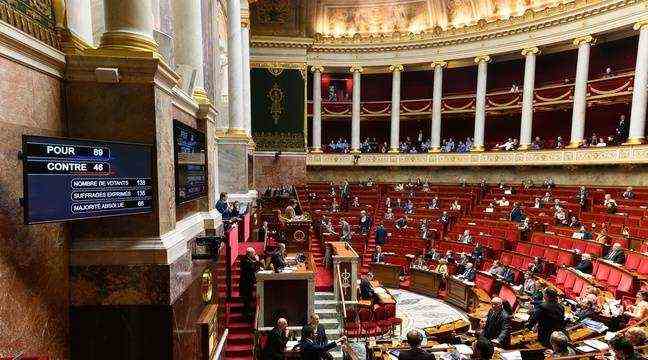National Assembly – Jacques Witt / SIPA
Lauded by the majority as a “marker of the five-year term”, but criticized by the left and environmentalists for its “inadequacies”, the National Assembly adopted the climate bill at first reading on Tuesday.
Adopted at first reading by 332 votes against 77, and 145 abstentions, including 6 LREM, the text is expected in the Senate in June. “The ecological fight is never over but with this law we mark a turning point”, rejoiced the Minister of Ecological Transition Barbara Pompili after the election.
A “formidable waste”
Inspired by the work of the Citizen’s Convention for the Climate (CCC) desired by Emmanuel Macron, the government project includes a series of measures, such as the elimination of certain domestic airlines in the event of alternatives of less than 2:30 by train, the creation of ‘an offense of ecocide or the ban on the rental of thermal sieve housing in 2028. Barbara Pompili recalled the “unprecedented process” of the CCC.
But the government finds itself at odds with its members who consider their proposals “unraveled”. Despite “some progress”, NGOs from the Climate Action Network also denounce a “tremendous waste”. A new “climate march” is announced on Sunday, after that of March 28. Smoke in hand and padlock around the neck, a dozen activists from Extinction Rebellion chained themselves to the gates of the Palais Bourbon on Tuesday, denouncing a text “indigent”.
“The big cars”
In the hemicycle, the left regretted the “self-satisfaction” of the government (Guillaume Garot, PS), despite a “stack of anecdotal measures” (Hubert Wulfranc, PCF). It is a law “of communication” (Loïc Prud’homme, LFI), “not up to the climate emergency” according to ecologist Delphine Batho. Several elected officials deplore the lack of ambition of the advertising component, which does not restrict advertising for the most polluting vehicles, such as “big cars”, says François-Michel Lambert (Freedoms and Territories). Marked by the “yellow vests” crisis born from a carbon tax on fuels, the majority insisted on the “crest line” between “ecological ambition” and “social acceptability”.
This social movement “reminded us how the acceptance of the population in the transition was crucial and did not go without saying”, said Marie Lebec (LREM) in the hemicycle. A clear caution about the heavy goods industry, very hostile to the text. The LREMs thus underline the many “stages” before the possible establishment of a regional ecotax in the voluntary communities. Rising against a “punitive ecology”, “taxes” and “permanent guilt” (Jean-Marie Sermier, LR), the right has mainly chosen abstention, promising the defense of a “positive ecology” during the presidential election. 2022. The elected RNs also abstained.
“30 billion of the recovery plan”
At the end of February, the High Council for the climate, an independent body, had pointed out “the reduced scope” of certain measures, with regard to the objectives of reduction of 40% of the emissions of greenhouse gases in France, in 2030, compared to to 1990. The European Union has also just strengthened its ambitions in 2030, to reduce emissions by 55% compared to 1990. “It is not this bill alone” which makes it possible to achieve French objectives, but “the sum” of several laws and the “30 billion of the greening axis of the recovery plan”, qualifies the Ministry of Ecological Transition.
The general rapporteur Jean-René Cazeneuve (LREM) insists on the “significant advances” obtained during the debates, with the impact limited by the health crisis. The ban on the rental of “thermal strainers” (housing classified F and G in energy performance) in 2028 was extended to housing classified E in 2034. The deputies also voted for “individualized support” for households at each stage. renovation and a partial guarantee for loans (“advance-transfer”) from low-income families.
Measures in favor of cycling have also been added, such as the widening of the premium for conversion to the purchase of electric bikes. For air, the elimination of certain domestic lines (between Paris-Orly and Nantes, Bordeaux or Lyon) animated the debates, although it endorses decisions already taken with Air France. The provision was contested by a handful of deputies of all stripes, mainly elected from the South West, where Airbus and its subcontractors irrigate economic activity.

